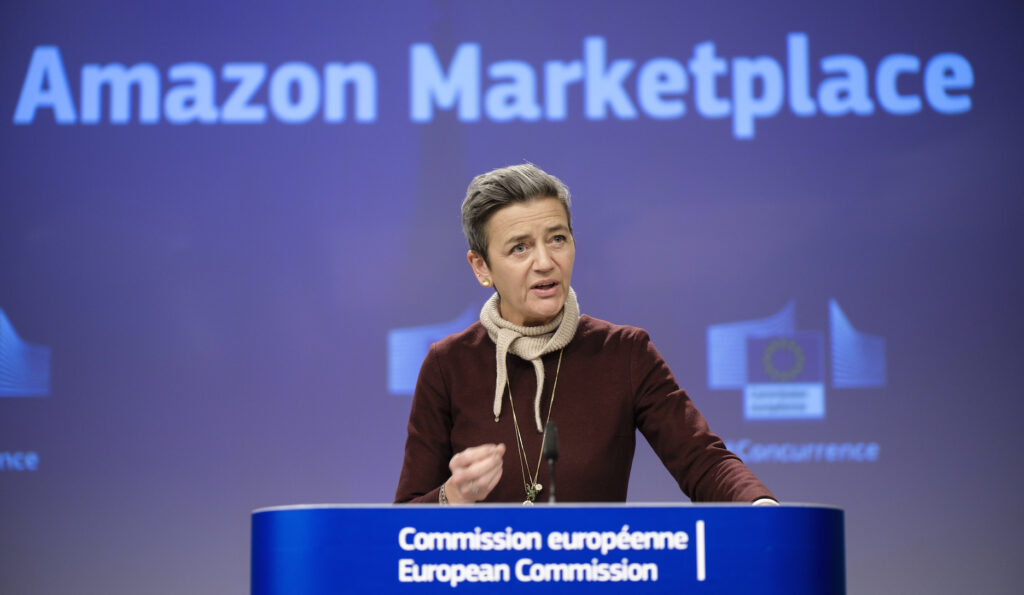In a significant setback for the US retail behemoth, the European Commission on Tuesday accused Amazon of violating antitrust laws. The EU announced on Tuesday the preliminary findings of its investigation against the firm, which it had begun in July, and claimed to have informed Amazon of its findings.

What is it that Amazon is charged with?
The accusations center on Amazon’s online marketplace, where the firm not only hosts more small-business vendors but also sells things directly. Amazon is charged with using information from those independent merchants to evaluate consumer trends and purchasing behavior. The EU investigation discovered that using data provides Amazon an unfair advantage and distorts competition.
The company’s Amazon Prime service is the subject of a second probe right now, notably the “Buy Box” that displays and drives customers to retailers who use Amazon’s own logistical service.
Some of the greatest names in Silicon Valley have come under scrutiny from EU antitrust officials, and some of these probes have resulted in record penalties. In 2010, the bloc began its first inquiry against Google, with the business is facing fines totaling over €8.2 billion ($9.7 billion) as a consequence of three distinct instances. Google received a record-breaking €4.34 billion penalties in 2018 for obstructing competitors with its Android mobile operating system. The business is fighting the fines. Regulators in the EU are also looking into Apple’s App Store and Apple Pay mobile payment system. The organization is also at the heart of the EU’s initiatives to increase the tax burden on US internet businesses. Regulators in the EU are also investigating Facebook’s practices around data collection and monetization.
European Union files antitrust charges against Amazon
Amazon is harming fair competition here in Europe. That is what the European Commission claimed when it accused Amazon of violating antitrust laws today. The e-commerce giant is accused of trying to gain an unfair advantage over suppliers that use its platform. According to the commission, Amazon gathers non-public data from consumers and sellers and uses it to capitalize on its dominance in France and Germany, two of its two largest European markets. In 2018, the European Union began investigating Amazon.
A fine of up to ten percent of Amazon’s yearly global revenue, or billions of dollars, may be imposed. The charges have been denied by the corporation. Here is what the executive vice-president of the EU Commission had to say about Amazon today: The insights that Amazon Retail has into the private business information of one specific seller are what we are worried about, not Amazon Retail itself. Rather, they relate to Amazon Retail’s understanding of the aggregated business information from more than 800,000 active sellers in the European Union spanning more than a billion goods. In other words, this is the case with big data. We have therefore come to the preliminary conclusion that the use of these data allows Amazon to focus on the sale of the best-selling products and this marginalizes third-party sellers and caps their ability to grow.”
So, when customers purchase or sell on Amazon, are they receiving a terrible deal? Let’s ask Augustine that question tonight. He works with the European consumer group BEUC, which advocates for the interests and protection of consumers in the European Union. You’re a welcome addition to the program.
Do you agree with the European Commission? Does Amazon harm the market’s competitiveness, and does the customer bear the costs? As consumer advocacy groups, we are similarly worried that Amazon would use the sensitive commercial information it gathers through its platform to inappropriately sway customers’ purchasing decisions in favor of Amazon. Here we’re talking about sensitive information that could range from the number of orders and ship units of products, the seller’s revenues on the marketplace, the number of visits to sellers’ offers, data relating to shipping, or to the seller’s past performance. So we’re talking about a substantive amount of data.
Executive Vice President Stagger said that by favoring its own products and making it more difficult for competitors to compete, these actions may end up damaging customers in the medium and long terms sellers to compete. Amazon could be reducing consumer choice of online products and sellers, and in the long run, even increasing prices. Consumers have to pay due to the lack of competition. So we are talking about an extremely important case. I know that when you use Amazon, it is true that the independent sellers, the offers that they make, are always smaller print, and Amazon doesn’t really make it You may see it when you visit their page.
What would you say, though, to those vendors who assert that no other marketplace can expose them to such a big client base as Amazon? Due to the lack of alternatives, it is precisely the issue we and the shops are currently experiencing. They must thus agree to the restrictions set by Amazon. Basically, there is a great degree of dependency. And if we think about the current pandemic and when shops have to close their doors due to the different confinement and lockdown measures taken by different member states, consumers have to go and buy online, and consumers are rushed into Amazon.
So basically, retailers were depending heavily on Amazon to reach out to customers. So what do you want? What actions do you want Amazon to take? If they were willing to do whatever you said to get rid of this anti-trust suit, what would they have to do? Well, first of all, they would have to address the specific concerns, and antitrust investigation takes time. We will be able to assess in detail the scope of the harm and the effects of these practices. So certainly, if Amazon would like to address these concerns, they will have to discuss how to deal with these data practices with the commissions in a way that they don’t get an anti-competitive advantage by gaining this data and the way that, of course, they use it vis-a-vis the retailers.
Mr. Maynard, I’ve got about 30 seconds here. Just wanted to get your thought. It’s about we see the European Union taking issue with Google, for example, and now with Amazon. Is the consumer in the European Union enjoying, in your opinion, the best protection that it can get anywhere on the globe? As consumers in the European Union, we are in a privileged position compared to consumers in other parts of the world. And not only regarding competition long-conditional enforcement but also consumer laws and data protection laws. The problem, however, is that talking about global companies, so these situations and this problem need to be tackled globally.
So we also depend to a certain extent on other jurisdictions actually to take um action against these companies. That’s a good point. That’s a very good point. Because of how important scale is to businesses like these Augustine Reyna with the European consumer organization BEUC.
Similar Posts
- FTC sues Amazon for illegally maintaining monopoly power
- US regulator files anti-trust lawsuit against online retailer Amazon | US trade watchdog sues Amazon
- Amazon & Google Antitrust Cases Highlight “Newfound Vigor” to Fight Monopolies
- Biden vs. Amazon: Is Amazon a Monopoly that Needs to be Broken Up?
- The government’s Amazon lawsuit explained | Amazon Anti-trust Lawsuit
- Why the US government and 17 states are suing Amazon?
- California files anti-trust lawsuit against Amazon
-

Top 7 Reasons Russian Girls Move to Dubai in 2026 – Russian Expats, Lifestyle & Career Guide
-

Sexism in Japan: 10 Shocking Sexism Causes & Statistics in Japan
-

Son saw You taking a Shower: 7 Steps to Handle When Your Child Sees You Showering


